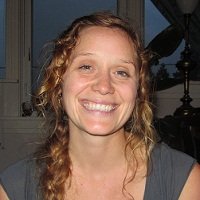How to Become a Teacher

Amber Stogsdill has been a teacher for seven years at Woodside Elementary School in Bothell, Washington. She earned a Bachelor of Education in special education from Gonzaga and then earned a Master of Education from the University of Washington.
She spent her first six years as a special education teacher in a resource room, and now teaches in a general education third grade class.
What is a teacher?
A teacher is someone who helps you realize your full potential. They believe in you and guide you along so that one day you can live a happy and productive life.
Why did you decide to become a teacher?
In a practical sense, I knew that I needed to get a job right after college. Teaching special education seemed like a very reliable path. I also knew that I could get my student loans forgiven and a master degree paid for. In a touchy feely sense, working with kids is awesome. Teaching is rewarding and important. It’s something that I can be proud of doing.
Can you please describe some of your experiences in the field?
I work in a low-income school, which can be challenging. Kids move in and out all the time. I have had many positive, as well as many difficult experiences. These experiences include: getting to know/working with an amazing group of teachers, working with a lot of great kids who face many challenges, working with some difficult kids, team teaching with our school’s speech and language pathologist, attending night classes for two years while working full time, working on and earning my national board certification, working with teachers to develop behavior interventions and academic interventions to address specific deficits, working with parents who are very involved and dedicated to their children, working with parents who are still children themselves, making home visits to low income apartment complexes, earning the educator of the year award, working in a very chaotic and unpredictable environment with kids who are very far behind, etc.
Are there common misconceptions about your profession?
I suppose. There are maybe two bad teachers for every 30 good teachers. The bad ones give the good ones a bad rap. Teachers work ridiculously hard and when kids do poorly, I think it has more to do with their parents’ ability to be parents.
What is a typical day like for you?
This year is like being a first year teacher all over again for me. I get to work between 7 and 7:30 a.m. I am running around like a crazed maniac until about 5 p.m. when I leave. I usually eat lunch in about 10 minutes and then use the rest of my break to plan. My tasks include, but are not limited to: reading/learning new curriculum in five subject areas, grading (which I spend two to three hours doing over the weekend), looking at curriculum maps and planning, posting student work, talking to fellow teachers, making copies, foraging for chocolate in the work room, calling or emailing parents, cleaning/organizing my class, analyzing student work to plan for future lessons, etc.
What are your favorite aspects of your job?
The kids are so dang smart. Yesterday a little girl started crying because I let the class “explore”/tear apart our sprouting bean plants in science. She was upset because she wanted to let them grow. Very sweet. The kids are the best part. They are all such individuals.
What are your least favorite aspects of your job?
My least favorite part is how I always feel like I’m one or two steps behind. I work so hard, and I am barely keeping my head above water. All the new curriculum is a killer. This is slowly getting better. In the long run I think my least favorite part will be preparing the kids to take the MSP (state test). There is so much pressure and the fun things get cut out.
Is there anything you would have done differently while studying to become a teacher?
Not really. I guess I could have been more studious... much more.
What classes did you take in college that are the most relevant to your job?
The most relevant thing was when I was actually working with kids. Many of the classes were pretty boring. The best ones were assessment, applied behavior analysis, and classroom management. I found my graduate level classes to be much more meaningful. I was more mature and a better student. Also, I had three years of teaching experience, so everything seemed much more relevant.
What personality traits do you think would help someone to be successful as a teacher?
Flexibility, creativity, compassion, positivity, stamina, kindness, and a good sense of humor doesn’t hurt.
What personality traits do you think might hinder someone's success as a teacher?
Being a control freak, impatient, short-tempered, negative, or easily frustrated.
What advice, or words of caution, would you give to a student who is considering studying to become a teacher?
Try it out before you commit to a program. Volunteer to work with kids in a classroom setting. The idea of teaching sounds so great, but it’s not for everyone. You will not make very much money for the first number of years, and student loans are a real bitch. Start as a special ed. teacher! It’s a great way to get your foot in the door and there are many financial incentives. Also, don’t go to grad school directly after undergrad. Get some teaching experience under your belt first.